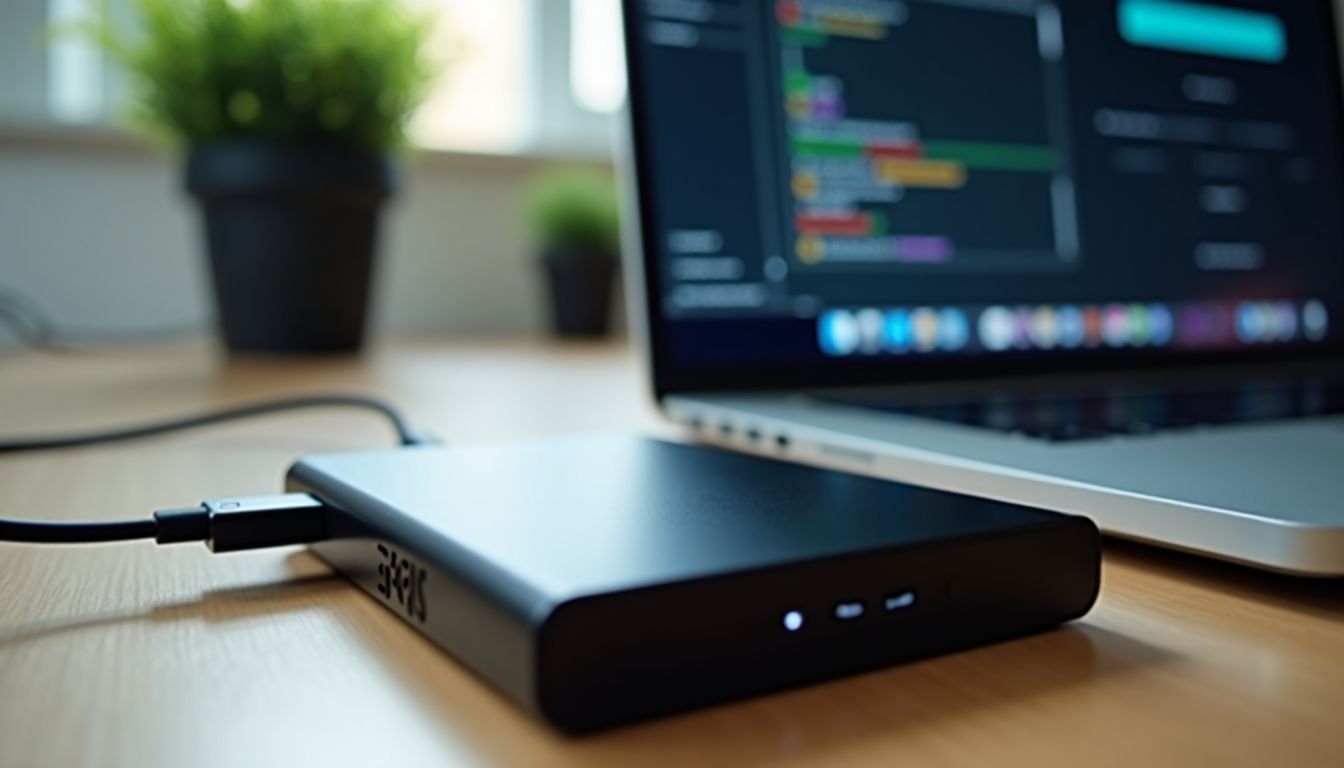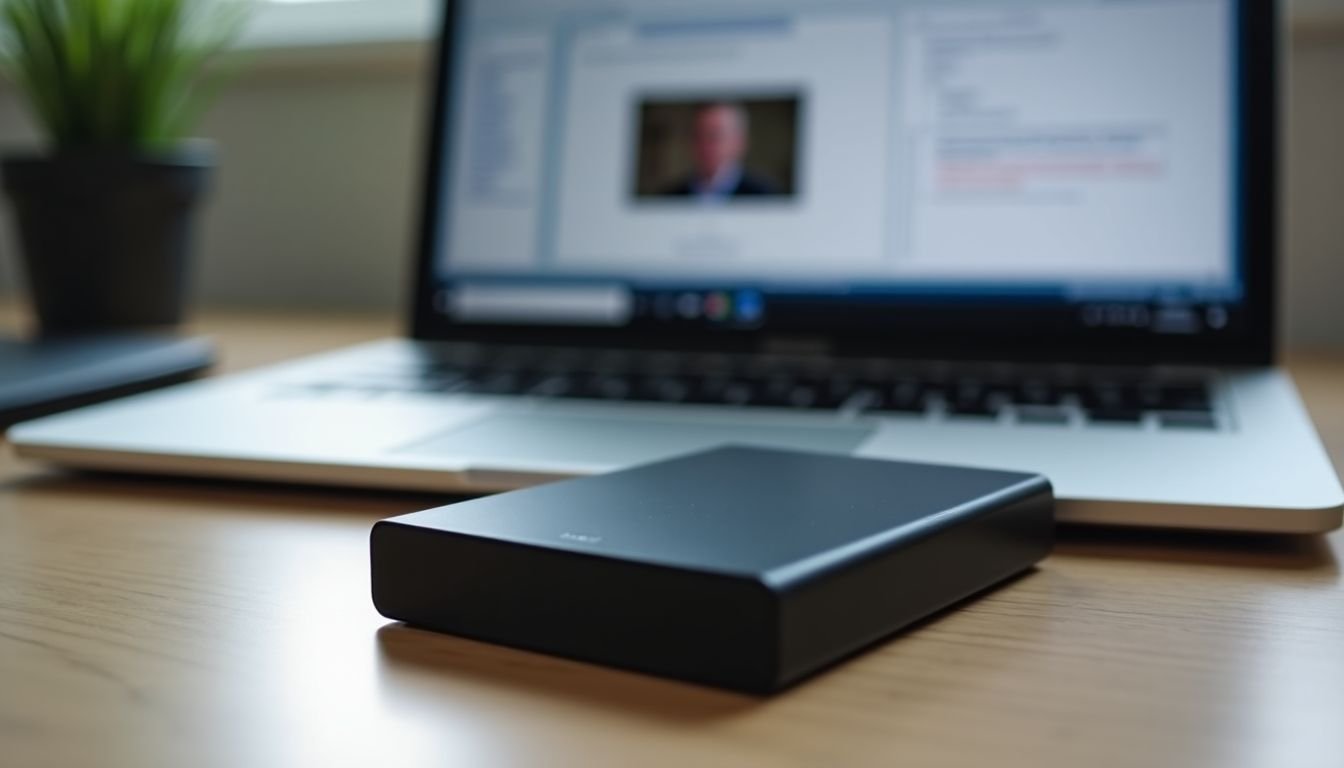How to Back Up Your Files with an External Hard Drive – Never Lose Data Again

Have you ever lost important files? Data loss can happen to anyone. This guide shows you how to back up your files using an external hard drive and other methods. Never lose data again.
Key Takeaways
- Backing up files onto an external hard drive offers a reliable way to protect against data loss. Choose a drive with at least 1TB of space for future needs.
- Regular backups are crucial, and using software can automate this process. Check your backup regularly to ensure all files are correctly saved without errors.
- Cloud storage serves as an additional backup method, providing easy access and extra security through encryption and two-factor authentication.
- Organizing files into clear user folders simplifies file management and retrieval, boosting efficiency during the backup process.
- Implementing multiple backup methods, such as combining cloud storage with physical external drives, strengthens data protection strategies.
How to Properly Back Up Your Files

To properly back up your files, start by connecting an external hard drive to your computer. Next, transfer your important documents and data onto the drive for safekeeping.
Using an external hard drive
Backing up your files with an external hard drive is a smart choice. It offers reliable data protection and helps prevent data loss.
- Choose a high-capacity external hard drive. Look for one that can hold all your important files, photos, and documents. Aim for at least 1TB of space to accommodate future needs.
- Connect the hard drive to your computer using a USB cable. Most modern computers recognize external drives automatically. This makes the backing up process quick and easy.
- Create a dedicated folder on the hard drive for your backups. Label it clearly so you can find it easily later. Organizing files into user folders simplifies file management.
- Use backup software to automate the process. Many options available allow you to schedule regular backups. Regular automatic backups ensure you never forget this task.
- Check your backup regularly for errors or missing files. Make sure everything backs up correctly each time. This step protects against unexpected data loss.
- Disconnect the external hard drive after use. Always protect it from power surges and physical damage by safely ejecting it first.
- Store the external hard drive in a safe place when not in use. Keep it away from moisture and extreme temperatures to ensure its longevity.
- Consider using encryption for sensitive files on the external storage device. This adds another layer of security and keeps your personal information private.
Backing up to the cloud
Backing up to the cloud ensures that your files are safe. Cloud storage provides an extra layer of protection against data loss.
- Choose a reliable cloud service. Research options like Google Drive, Dropbox, or OneDrive for effective data backup solutions.
- Upload files regularly. Set a schedule to back up new and updated files consistently.
- Use strong passwords. Protect your account with unique and complex passwords for better file security.
- Enable two-factor authentication. This adds another level of protection for your data management.
- Store sensitive data securely. Use encryption features available in many cloud services to keep personal information safe.
- Monitor storage limits. Keep an eye on your available space to avoid issues with data storage.
- Organize your backups logically. Create folders within the cloud storage to easily find specific files when needed.
- Sync across devices. Utilize syncing features so that your files remain accessible on all your devices.
Cloud backups enhance your overall data recovery plan while providing easy access and file redundancy.
Importance of Regular Backups

Regular backups protect you from unexpected data loss. They save you time and reduce stress when issues arise.
Protection against data loss
Backing up your files protects against data loss. An external hard drive serves as a reliable backup method. It allows you to store important documents, photos, and videos safely. With this device, you control your data security better.
Files can be recovered easily if something goes wrong with your computer.
Using an external hard drive provides peace of mind. Many people have experienced sudden data loss due to hardware failures or accidents. In fact, studies show that 60% of individuals lose their digital files at some point in their lives.
Backing up regularly helps prevent such issues and saves time during stressful moments. Rely on solid backup methods to safeguard your valuable memories and work efficiently.
Saving time and stress
Backing up your files regularly helps you save time and stress. You avoid the panic of losing important documents when accidents happen. Data loss can disrupt your life or business, but frequent backups make recovery easier.
Using an external hard drive for storage simplifies the process. You can quickly transfer files without searching through multiple devices or platforms.
Staying organized also reduces anxiety. Create user folders to store similar items together. This way, finding a specific file becomes a breeze, saving you precious moments when every second counts.
Regular hard drive backup ensures peace of mind and lets you focus on what truly matters in your daily routine.
Tips for Effective File Backup

Organize your files into clear user folders. Use a mix of backup methods to strengthen your data protection strategy.
Organizing files into user folders
Organizing files into user folders boosts efficiency. It simplifies access to important documents while preventing data loss.
- Create main folders for each project or category. This setup keeps everything related in one place.
- Label subfolders clearly with specific names. Use terms that describe the content accurately for quick retrieval.
- Move old or unused files to an archive folder. This declutters your primary workspace and helps you focus on current tasks.
- Use consistent naming conventions for all files. Stick to a format that includes dates or relevant keywords for easier searching.
- Regularly review and clean out unnecessary files. Doing this prevents confusion and maintains an organized system.
- Back up your organized folders regularly using an external hard drive or cloud service. Frequent backups protect against potential data loss situations.
- Encourage collaboration by sharing specific user folders with team members if needed. This promotes teamwork without losing track of individual contributions.
Implementing these steps strengthens your file backup strategy while ensuring digital preservation. Keeping your data organized plays a vital role in effective hard drive management as well.
Using a combination of methods
Using multiple backup methods provides better data loss prevention. This strategy strengthens your protection against losing important files.
- Combine cloud storage with an external hard drive. Cloud storage keeps your files safe online, while an external drive offers physical access. Sync your important files to both for added security.
- Schedule regular backups for both methods. You might set a reminder on your phone or calendar. Consistency helps ensure you never miss backing up crucial data.
- Use file synchronization software. This tool automatically updates changes between your computer, the cloud, and the external hard drive. It saves time and minimizes the chances of forgetting to back up your files.
- Keep older versions of files in separate folders. Sometimes, you might need to restore previous versions of documents or photos. Storing these separately can be a lifesaver during emergencies.
- Test your backup systems regularly. Occasionally check if you can retrieve files from both the cloud and the external hard drive. A successful recovery test ensures that everything is functioning correctly.
Taking action now will secure your data against potential loss in the future.
Conclusion

Backing up your files can save you from a lot of headaches. Start now to protect your important information and ensure peace of mind.
Benefits of regularly backing up files
Regularly backing up files offers peace of mind. It protects you from losing important data due to accidents, hardware failures, or malware attacks. An external hard drive makes this task simple and effective.
You can save everything from vital documents to cherished photos in one secure location.
Reducing stress is another benefit of consistent backups. Knowing your files are safe allows you to focus on other tasks without worry. First-hand experience shows that many people feel overwhelmed by data loss after a crash.
Taking action today can prevent these headaches tomorrow with an effective backup plan using an external hard drive.
Take action to secure your data.
Backing up your files is crucial for data security. Use an external hard drive to store copies of important documents, photos, and videos. Connect the drive to your computer and transfer the files you want to protect.
Creating multiple backups ensures that you won’t lose anything valuable.
Taking action now makes a difference later. Schedule regular backups to keep your data safe and organized. This simple step can save time and prevent stress in case of unexpected issues like hardware failure or accidental deletions.
Secure your data today so you never have to worry again about losing it tomorrow.
FAQs
1. What does it mean to back up files with an external hard drive?
Backing up files with an external hard drive means copying and storing your data on a separate device. This ensures you never lose important information.
2. How do I start the process of backing up my files to an external hard drive?
To back up your files, first connect the external hard drive to your computer. Then, select the files you want to store and copy them onto the drive.
3. Is using an external hard drive a secure way to protect my data from loss?
Yes, using an external hard drive is a reliable method for safeguarding your data against loss or damage.
4. If I have backed up my files on an external hard drive, can I still lose data?
Once you’ve copied your important documents onto an outside disk, they’re safe unless the device gets damaged or lost itself. Regularly updating this backup will ensure all recent work is preserved.